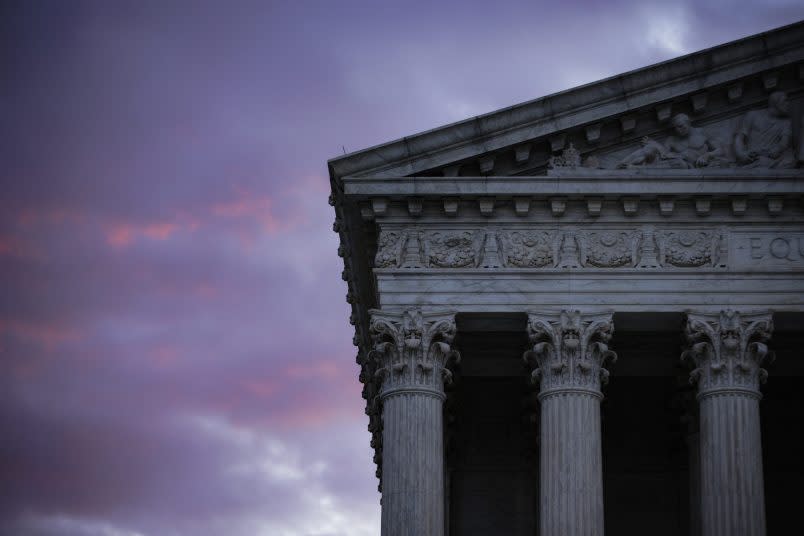SCOTUS Delay in Immunity Case Denies Voters Crucial Information for 2024 Election

- Oops!Something went wrong.Please try again later.
- Oops!Something went wrong.Please try again later.
This article is part of TPM Cafe, TPM’s home for opinion and news analysis.
Ahead of the November presidential election, voters are navigating changing electoral maps, changing state voting laws, and an unprecedented and deeply troubling situation our country has yet to face: one candidate for president has been convicted of a felony in state court and three more felony criminal cases are pending against him. Fully 48 percent of voters say reaching a verdict in Donald Trump’s federal election interference trial is critical before November. But thanks to the Supreme Court, they will enter the voting booth without knowing if Trump has been found guilty of a federal crime.
The Supreme Court has slow-walked Trump’s criminal cases at every turn. In December 2023, the Court denied the Department of Justice’s request to hear Trump’s claim that he is absolutely immune from criminal prosecution, opting to instead let the question make its way up to the justices through the lower courts. After the D.C. Circuit heard Trump’s argument and decided unanimously against him within 28 days, the Supreme Court waited 22 days before it announced it would indeed hear Trump’s claim of presidential immunity, scheduling oral arguments for the last day of its term, 57 days later. The ultra-conservative Supreme Court has weaponized time to delay accountability for their friend Donald Trump and influence the November election.
The immunity question stemming from Trump v. United States isn’t the first time the Supreme Court has heard a crucial electoral case. In past cases, the justices acted with the swiftness and urgency that those cases demanded. It only took the Court three days to hand down a decision in Bush v. Gore. A decision only took two weeks in U.S. v Nixon. But today’s 6-3 conservative Court introduced significant delay and procedural hurdles to give Donald Trump what he needs most for his legal defense: time. Friendly justices have given him nearly five months of it — so far. This delay comes despite the fact that the justices are hearing fewer cases today than at almost any other time in the Court’s history. The Roberts Court has been consistently deciding fewer cases each term.
It is increasingly obvious to Americans who are paying attention that the Supreme Court is no longer a neutral arbiter of the law, but a partisan outfit willing to protect its political allies and overturn long-established precedents like Roe v. Wade for ideological reasons. Nearly 6 in 10 of Americans view the Court negatively. In the 2000s and much of the 2010s, the Court enjoyed approval ratings above 50 or 60 percent. This new scrutiny comes as Americans have been given a front row seat to numerous ethical scandals on the Court. Trump v. United States presents an obvious conflict of interest for Justices Clarence Thomas and Samuel Alito. Ginni Thomas’ efforts to overturn the 2020 election are well known. Rather than recuse himself and despite the Court’s new sham of a code of conduct, Justice Thomas ignored calls from legal experts and Democratic lawmakers. After revelations that a ‘Stop the Steal’ flag flew at Samuel Alito’s residence, Justice Alito joined Justice Thomas in disregarding calls to remove himself from the case, thumbing his nose at Congress and federal laws requiring justices to recuse themselves when their “impartiality might reasonably be questioned.” We simply cannot trust the justices to rule without bias and uphold the integrity of our elections when they’re so clearly aligned with Donald Trump.
Congress has the power to rein in the Supreme Court through robust legislation. The Supreme Court Ethics, Recusal, and Transparency Act which would require the justices to abide by a code of conduct with actual enforcement mechanisms. Nearly 7 in 10 Americans support a real code of conduct for the Supreme Court.
Congress also has critical legislation in the Supreme Court Tenure Establishment and Retirement Modernization Act, which was re-introduced by Rep. Hank Johnson (D-GA). The TERM Act would create 18-year terms for current and future Supreme Court justices. By an overwhelming 40-point margin — 64 percent to 24 percent — voters favor congressional action to set 18-year term limits. With that level of support, one may ask, what’s Congress waiting for?
Americans should be able to trust Supreme Court justices to carry out their duties impartially and ethically, but their undemocratic decisions and delaying tactics clearly demonstrate they’re not working on behalf of the American people. Months before the November election, we’re already seeing the immense impact these politicians in robes will have on the 2024 election. It is ludicrous to sit by and wait for another scandal or another decision that reeks of extremism and partisanship. The Supreme Court has proven numerous times it will not reform itself. Congress must step up and reform this unchecked Court.

